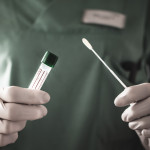A therapeutic vaccine designed to help the immune system better control human papillomavirus (HPV) was nearly 50 percent effective in eliminating precancerous genital lesions, according to a study published November 5 in The New England Journal of Medicine. These encouraging data raise hopes for treating other HPV-related cancers, notably of the cervix and anus.
Currently, two vaccines are approved in the United States to prevent infection with the strains of HPV that can cause cervical and anal cancer: Merck’s Gardasil and GSK’s Cervarix. Neither vaccine, however, has any effect on HPV once a person has become infected with the cancer-causing strains of the virus.
Cornelis Melief, MD, PhD, from the Leiden University Medical Center, in Leiden, the Netherlands, and his colleagues, however, have been working on the development of an HPV vaccine that would hopefully help the body control HPV after a person becomes infected. Melief and his team have developed a proprietary technology for creating synthetic protein segments of HPV and incorporating them into a vaccine. In this case, they designed a therapeutic vaccine against HPV type 16, one of the most common strains known to cause cancer.
Working in Melief’s lab, Gemma Kenter, MD, PhD, and her colleagues gave the vaccine to 20 women—all HIV negative—who had an advanced stage of precancerous lesions on their vulvas, called VIN3. One year after vaccination, 79 percent of the women had measurable regression of their lesions, and 47 percent had complete resolution. The women remained free of lesions for at least two years after vaccination.
The authors acknowledge that further research will be needed in larger numbers of women, and in a controlled study, to determine the vaccine’s efficacy and to gauge its effect on cervical lesions. Clinical trials will also be required to explore the utility of the vaccine in treating precancerous anal lesions, as well as HPV-related lesions in people living with HIV.
Advertisement
Advertisement
Advertisement






Comments
Comments